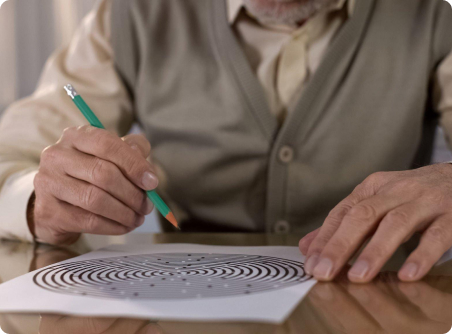Contact Us




Our mental health includes all aspects of our wellbeing - emotional, psychological, and social. It influences our thoughts, emotions, and behaviors. It also affects how we deal with stress, communicate with others, and make wise decisions. From childhood and youth through maturity, mental health is crucial for everyone.
In the course of our lives, if we encounter any mental health issues, it may have an impact on how we think, feel, and act. Biological variables, like genes or brain chemistry; life experiences, such trauma or abuse; and a family history of mental health issues are just a few of the many elements that affect mental health. Although there is help available, mental health problems are very common. People who struggle with mental illness can get better, and many of them recover completely too.
Early detection and treatment, according to our research, improve outcomes. Additionally, early intervention may minimize long-term disability and avert years of misery. In this country, healthcare screenings are typical, and mental health assessment should be no different.
When looking for resources and assistance, Samvedna Caresuggests that screening is one technique to determine what the potential underlying issue(s) may be. The purpose of using screening tools or online mental health screening tools is to provide a brief overview of our mental state, after which the mental health professional can perform a thorough evaluation, in order to assess the clients in a better way.
Enquire nowA mental health screening is a collection of standard set of questions that the individual must answer to the mental health professionals, to check for indicators of a mental health condition. The inquiries aid the providers in understanding a person's disposition, way of thinking, actions, behavior and memory. Early detection of mental health issues is possible with a mental health screening. Mental Health Screenings or Online Mental Health Screenings are a key part in identification of mental health. Between the ages of 14 and 24, 50% of all mental health issues over the course of a person's lifetime start. However, it takes an average of 11 years to intervene once the first sign of symptoms appears. Screenings or mental health assessments can bridge the gap by enabling early detection and intervention.


The screening is carried out by a mental health expert using a range of tools to evaluate the person's emotional stability and feelings as well as their cognitive health, which includes their capacity for clear thought, effective communication, and memory. Other aspects include evaluating your social and interpersonal abilities.
One of the most important things you should do before an exam is to keep track of your sleeping patterns and sleep quality. Everyone must respond to a series of questions during a mental health screening so that a mental health expert can search for signs of a mental condition. An evaluation of your mental health might identify mental diseases at their earliest stages.
Get In TouchThe mental health screening questions help the provider better in grasping a person's personality, thinking style, activities, and memory. An evaluation of the individual’s mental health might identify mental diseases at their earliest stages. A mental health screening is not meant to punish, embarrass, or guilt the patient or even to identify a specific mental health issue. Although mental health screenings can aid mental health professionals in their diagnosis, they only provide a portion of the data required to make a formal diagnosis.
Health professionals and mental health professionals perform a mental health screening to determine whether a patient needs to see a mental health professional. Numerous mental health screenings can then be utilized to direct treatment once a relationship has been established with a mental health professional. A well-executed mental health screening can also distinguish between physical and mental health issues.

Typically, mental health assessments or screenings involve asking a number of questions. The patient doesn't need to get ready. Depending on the kind of mental health condition, the healthcare professional suspects, different questions may be asked. Once the patient is receiving therapy, mental health specialists may perform more thorough screens and assessments. Most screenings are straightforward and can be completed by the patient themselves using a questionnaire. Let's examine a few of the most prevalent diseases and the testing that are available for each.
Apathy, sadness, and a low mood are all warning indicators of potential depression. A quick and accurate approach to screen for depression is PHQ-9 (Patient Health Questionnaire). This evaluation can be presented in the form of a questionnaire, and it usually takes the provider less than 3 minutes to review it. A score is generated from the patient’s responses and is based on a numerical value; higher scores are correlated with more severe depression.


To determine which patients are at a risk of suicide, the Columbia Suicide Severity Rating Scale (C-SSRS) is frequently employed. The scale is available in four variations, ranging from a condensed form for screening to a longer version used by mental health practitioners for individuals under treatment. These queries may be asked orally during an interview or through patient self-report. The responses are scored and evaluated. Higher scores often indicate a higher risk of suicide.
Anxiety and depression frequently co-occur, and anxiety frequently results in physical symptoms that cannot be explained by other factors. The Generalized Anxiety Disorder (GAD-7) scale is the instrument used most frequently to test for anxiety. The GAD-7 can be utilized in an interview setting, similar to the aforementioned tests, or it can be self-reported through a questionnaire.
Get HelpTo learn more about our services, check out Samvedna Care. We are an excellent place for non-crisis support. Click on the link and you can learn how to talk about mental health or how to get help for yourself or someone you care about. Also, try and assess yourself today with the help of MAP Tool available on our webpage.
Get In Touch

WithGet in touch by calling us
7428097301 or you can Drop a Query here
You Can Also Email Us